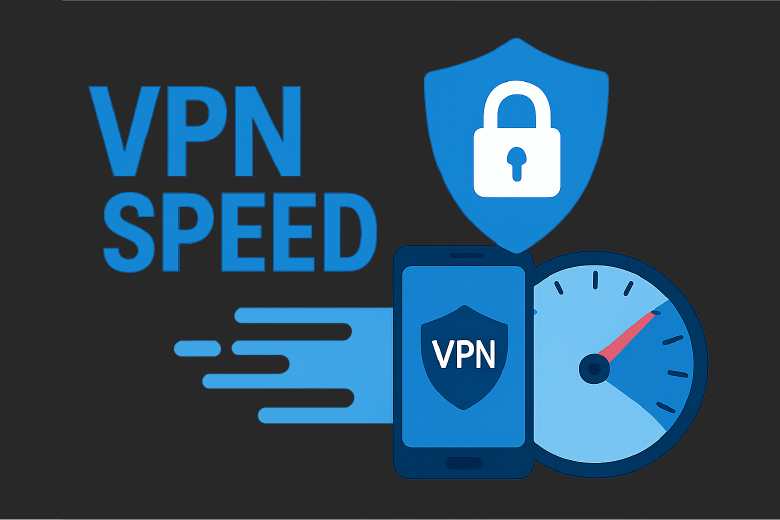Do VPNs Make Your Internet Connection Slower?

Do VPNs Make Your Internet Slower?
Short answer: yes — but usually not by much.
Using a VPN adds a little extra work for your internet connection. Your data gets encrypted and sent through another server before it reaches its destination. That takes a bit more time and can slightly drop your speed.
But if you’re using a decent VPN with nearby servers and a solid internet connection, you’ll probably barely notice it during everyday stuff like browsing, video calls, or even streaming Netflix.
Why a VPN Might Slow Things Down
Not all slowdowns are the same. Here’s what’s going on behind the scenes when you turn on a VPN:
-
Distance to the VPN server
When your connection takes a detour through a VPN, the longer that detour is, the slower things can get. For example, if you’re in the UK and connect to a server in Australia, your data’s basically going halfway around the world and back. That adds latency (lag).
Tip: Connect to a server that’s close to where you actually are. -
Encryption takes processing power
VPNs scramble your data to protect it. That’s good — but it takes work. Your device and the VPN server both need to encrypt and decrypt everything.
Most modern phones, laptops, and routers can handle this without breaking a sweat. But on older or underpowered gear, it can make a difference. -
Server overload
If a VPN server is full of other users (this happens a lot with free VPNs), it slows everyone down. Paid services usually spread users across more servers to keep things moving.
Tip: Some VPN apps show server load — pick one that isn’t jammed. -
Your own device or network
A slow Wi-Fi connection, a dusty old router, or a bargain-basement broadband plan can all become bottlenecks — with or without a VPN.
The VPN might just be revealing that your internet was already struggling. -
Your ISP might be part of the problem
Some internet providers throttle (intentionally slow down) specific types of traffic — like video streaming or torrents. When that happens, your connection might feel slow even without a VPN.
Sometimes, turning on a VPN fixes that by hiding what you’re doing.
How Much Speed You Actually Lose
There’s no fixed answer — it depends on your setup. But here’s a rough idea of what to expect:
-
With a good VPN:
Maybe a 5% to 15% drop in speed. Most people won’t notice unless they’re gaming or uploading big files. -
With a poor VPN or bad connection:
Things can get ugly. Tests have shown slowdowns of 50% or more in worst-case scenarios — usually when people use free VPNs, overloaded servers, or connect to faraway countries. -
Important:
The slower your starting connection, the more you’ll feel any drop.
Going from 100 Mbps to 85 Mbps? Barely noticeable.
Going from 10 Mbps to 5 Mbps? That’s a pain.
Can a VPN Ever Speed Things Up?
Actually, yes — in very specific situations. Here’s when a VPN might help instead of hurt:
-
Your ISP is throttling you
If your provider is slowing down certain services (like YouTube or Netflix), a VPN hides what you’re doing. That means your ISP can’t target specific apps anymore — and your speeds may jump back to normal. -
Poor routing between your ISP and a site
Sometimes your provider’s path to a game server or website is messy or congested. A VPN might give you a better, faster route — especially if the VPN has better network partnerships (called peering).
It’s not common, but it does happen.
How to Keep Your VPN Speeds Fast
Here are a few quick ways to make sure your VPN isn’t dragging you down:
-
Pick a nearby server
Less distance = less lag. If you’re in New York, don’t connect to Tokyo unless you need to. -
Watch server load
Many VPNs show how busy each server is. Pick one that isn’t overloaded. -
Use a fast protocol
If your VPN supports WireGuard, use it. It’s faster and lighter than older options like OpenVPN. -
Upgrade your gear if needed
An old router or slow internet plan might be the real problem. A VPN can’t fix bad hardware. -
Cut down other traffic
Large downloads, Zoom calls, and backups all eat bandwidth. Close what you’re not using. -
Stick with a trustworthy VPN
Free VPNs are often slow for a reason — they jam tons of users into small servers. Paid options usually have way more capacity (and fewer sketchy practices). -
Skip extra-heavy privacy settings unless you need them
Features like double VPN or Tor over VPN add more privacy — but also slow things down. Use them only when necessary.
So… Are VPNs Worth It If They Slow You Down?
Yes — especially if you care about privacy or need to unblock content.
The small speed hit is a fair trade for keeping your browsing hidden from ISPs, advertisers, and trackers. And if you follow the tips above, you’ll likely barely notice the difference.
That said, not all VPNs are equal. If yours cuts your speed in half or makes Netflix buffer like it’s 2005, something’s wrong — it might be time to try a different provider.
